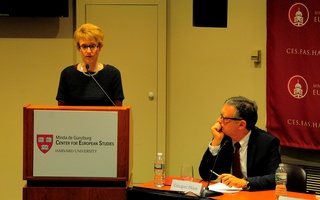Nieman Fellow Alisa Sopova and Anastasia Taylor-Lind, a fellow from the Davis Center for Russian and Eurasian Studies, presented their postcard project about the ongoing conflict in Ukraine Thursday evening and discussed the need to humanize victims of violence.
Their project, which sends postcards to individuals around the world containing idyllic photos of Donetsk, Ukraine juxtaposed with death notices, has sought to raise awareness of lost lives in Ukraine.
Sopova and Taylor-Lind said they hope to shed light on the realities of war.
Taylor-Lind, a photojournalist, began taking portraits of rebel soldiers in Kiev, Ukraine in 2014. Disillusioned with what she considered the mainstream media’s negative portrayal of Ukraine, she sought to photograph Ukrainian society more accurately.
“Just in the midst of photographing everything else, I began to feel a moral obligation to think about the way I was representing the Ukrainians,” she said.
Taylor-Lind’s partnership with Sopova, a Ukrainian journalist from Donetsk, began in 2015. Together, they bought hundreds of “Welcome to Donetsk” postcards to send abroad with names of individuals who had been killed during the conflict.
“At first I was skeptical of the project,” Sopova, Harvard’s first Ukrainian Nieman Fellow, said. “But then I saw people who were responding and feeling emotions about my city.”
The overwhelmingly positive social media response to the project fueled its continuation, according to the organizers. Following this outpouring of support, Taylor-Lind and Sopova used their personal expenses to purchase and mail out more postcards, at times relying on volunteers to help write cards.
Sopova also reached out to the United Nations, rebel organizations, and Russian social media sites to collect more than 2,000 names of the killed civilians, adding that there is no current, accurate count.
“This is what the government or the United Nations should be doing,” Taylor-Lind said, referring to Sopova’s investigative work.
Audience members, including other Nieman fellows, lauded Sopova and Taylor-Lind’s work.
“It’s really eye-opening, because as Americans we don’t always understand what goes on in other countries,” Nieman Fellow Felicia J. Fonseca said.
“The value [of the presentation] comes from challenging the way mainstream media typically delivers information to the public,” Design School student Hernan B. Bianchi said.
Recommended Articles
-
UkraineMuch of the world's attention was focused on Ukraine in late April and early May, following the meltdown at the
-
RELATIVES CONTEST NIEMAN WILL GIVING HARVARD MONEYRelatives of Agnes Wahl Nieman, widow of the founder of the Milwaukee Journal and recent donor of three to five-million
-
FRONTS OF UNIVERSITY WARFARE: ACADEMICThere are universities which vie with Harvard in architectural beauty; there are those which exceed it in enrollment; and there
-
Book Collections for Overseas Open TodayAs part of a nation-wide campaign to send academic books to war-devastated libraries abroad, collecting points have been set up
-
 Scholars Discuss Origins of Ukraine Crisis, Int'l Reaction
Scholars Discuss Origins of Ukraine Crisis, Int'l Reaction













